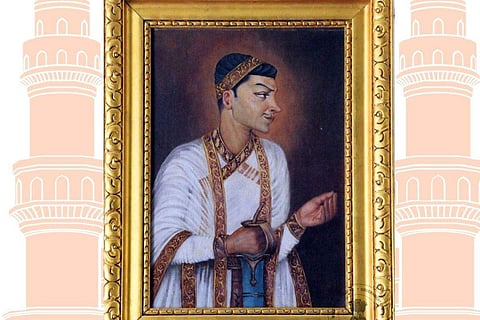
- LIFESTYLE
- FASHION
- FOOD
- ENTERTAINMENT
- EVENTS
- CULTURE
- VIDEOS
- WEB STORIES
- GALLERIES
- GADGETS
- CAR & BIKE
- SOCIETY
- TRAVEL
- NORTH EAST
- INDULGE CONNECT

The advent of Basant or spring signifies rejuvenation. It is greeted with joyous celebrations and communities come together to revel in the renewal of life and the promise of prosperity that this season brings. The festival of Basant Panchami marks the onset of spring and is also celebrated by honouring goddess Saraswati. “In the Deccan, Basant was celebrated by all communities. It was Sultan Muhammad Quli Qutub Shah (fifth Sultan of the Qutub Shahi dynasty) who started celebrating the Basant festival as it suited the purpose of the Qutub Shahs who wanted to identify with the Dakhnis and their traditions,” said Mohammad Habeeb, a member of the Paigah family, the reputed nobles of the Nizams.
Talking about the celebrations associated with the arrival of Basant during the reign of Qutub Shahs, he said, “The only source of information that gives us an idea about the festival are the poems written by Sultan Muhammad Quli Qutub Shah and Sultan Abdullah Qutub Shah (seventh Sultan of the Qutub Shahi dynasty). This information is meagre yet authentic and reliable as it is directly from the pen of the rulers. Through Muhammad Quli Qutub Shah’s words, we learn that Basant brought joy and pleasure to the Sultan and the people of his kingdom.” The palace and gardens of the Sultan would be filled with heaps of flowers and the water tanks were filled with colours. The Sultan and the ladies of the harem spent this day celebrating the Basant festival.
“Muhammad Quli Qutub Shah wrote nine poems for the occasion and the spirit of his joy is evident from the poems that he wrote,” said Habeeb, sharing a few translated versions of the Sultan’s poems:
“Basant has arrived with the tidings of joy in the presence of the Sultan,
Its advent has rendered the garden blooming with flowers and fruits,
The flora and fauna of the Basant beckon other flowers to join them in pleasure,
The heralding beauty of blooming flowers, made the skies blushing red,
In the bright light of the sun and the moon, the colours of the Basant reflect over the sky.
Because of the Basant, every house is full of pearls and rubies. It appears as if Basant has made even the poor, rich” [Source: Kuliyat-e-Muhammad Quli Qutub Shah - Poem No. 5]
The following poem was penned by Sultan Abdullah Qutub Shah, who followed Muhammed Quli Qutub Shah in most of his practices and he too wrote poems describing the festivals that were celebrated during his reign. Habeeb shared a translation of one of his poems:
“Basant has come with flowers,
Bring me the bottle and the cup of wine.
Flowers of different vistas have bloomed in the garden.
It is the time to get closer to each other,
The green, flowering trees are brimming. The spirits, with joy and pleasure,
The swings at the banks (of the tanks) are swaying,
It is the time to drink wine,
So, make up your mind to drink.” [Source: Kuliyat-eAbdullah Qutub Shah]